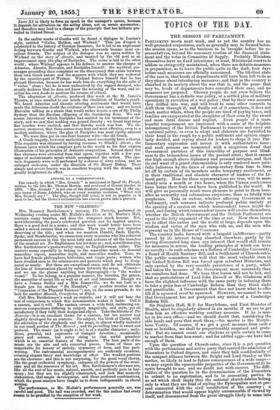THE NEW "ORATORIO."
Mrs. Mounscy Bartholomew's oratorio, The Nativity, performed on Wednesday evening under Mr. Mullah's direction at St. Martin's Hall, contains many beauties, and does the composer much honour. But, notwithstanding the poet's celebrated question and its implied answer, there i8 a good deal in a name; and this work would better have been
• called a sacred cantata than an oratorio. There are very few oratorios -deserving of the title ; and when we mention Handel, Bach, Haydn, 8pohr, and Mendelssohn, we enumerate every musician who has achieved permanent success in this the most lofty and arduous of all the branches -of the musical art. No Englishman has yet done so ; and, notwithstanding Mrs. Bartholomew's praiseworthy essay, no Englishwoman either. The oratorio seems especially to belong to the masculine mind—to demand masculine vigour, masculine depth, and masculine studies. True, we have had female philosophers, historians, and tragic poets; women who have rivalled men in the attainments and pursuits which may be desig- nated as manly: But these are exceptional cases, and do not obliterate the line of demarcatiorrplaced by nature between the sexes. Woman— and we use the phrase anything but disparagingly—is "the weaker vessel." To her belong, in a peculiar manner, the beauties, the graces, -the amenities of social life as well as of art and literature. Though we have a Joanna Baillie and a Mrs. Somerville, we do not look to a female pen for another "De Montfort," or another treatise on the -" Connexion of the Physical Sciences "; nor, on the same grounds, do we
• 'kook for another Messiah, Crucifixion, or Elijah. Call Mrs. Bartholomew's work an oratorio, and it will not bear the 'test of comparison to which this denomination makes it liable. Call it .a cantata, and it will. The cantata covers a wide field, embracing nu- merous compositions differing in subject, magnitude, and style, yet all satisfactory if they fulfil their design and object. Take the libretto of The • Nativity—it is an excellent theme for a cantata, but too narrow and slightly developed for an oratorio. Its subject, the birth of Christ, with the adoration of the shepherds and the magi, is almost wholly included in one small portion of The Messiah ; and its prevailing tone is sweet and pastoral. The music (as it ought to be) is of a similar character ; graceful, and expressive of tranquil devotion ; occasionally -grave and solemn, but never rising to that awful grandeur "which is an essential feature of the oratorio. The best parts of the music are the airs and solo concerted pieces. Some of these are remarkable for beauty of melody, symmetry of form, and fine part- - writing. The instrumental accompaniments are uniformly excellent, evincing elegant fancy and knowledge of effect. The weakest portions are the choruses : and this is not surprising, for the great vocal chorus, like the great orchestral symphony, exhausts all the powers of the musi- cian and all the resources of his art. Mrs. Bartholomew's choruses are, like all the rest of her music, natural, smooth, and perfectly pure in har- mony; but they are too slightly ednatructed, and lack that masterly elaboration, that ample development, and those profound combinations, -which the great masters have taught us to deem indispensable in choral writing.
The performance, as Mr. Hullah's performances generally are, was careful and good. The hall was crowded, and the fair author had every reason to be gratified by the reception of her work.


























 Previous page
Previous page